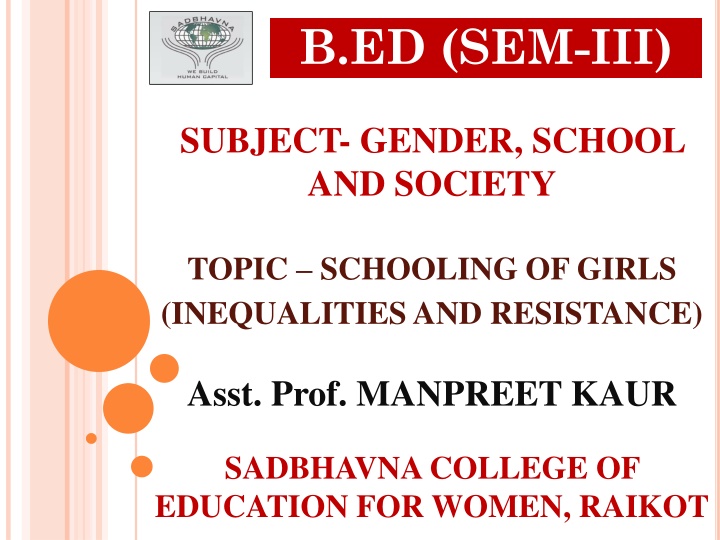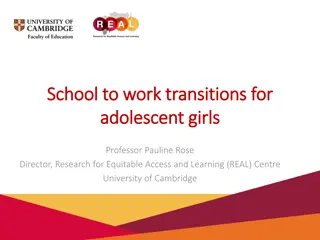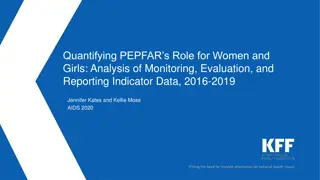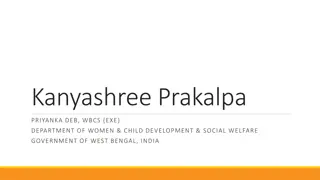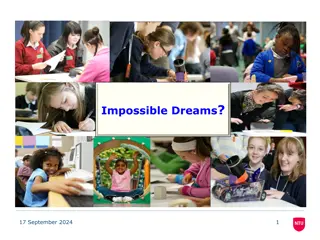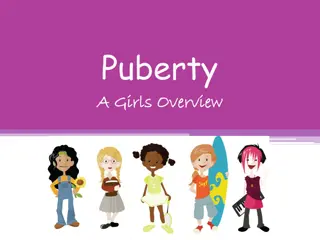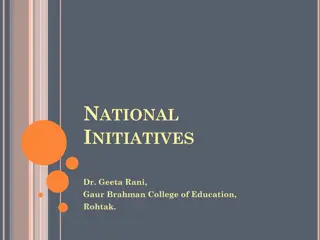Challenges and Importance of Girls' Education in India
Gender inequality in education is a significant issue in India, particularly affecting girls who face barriers such as societal expectations to prioritize household duties over schooling. Educating girls is crucial for various reasons like empowering women to participate in decision-making processes, reducing support for extremism, improving socio-economic conditions, decreasing maternal mortality, and child marriage, and contributing to educated future generations. Addressing these inequalities is vital for the overall progress and well-being of society.
Download Presentation

Please find below an Image/Link to download the presentation.
The content on the website is provided AS IS for your information and personal use only. It may not be sold, licensed, or shared on other websites without obtaining consent from the author.If you encounter any issues during the download, it is possible that the publisher has removed the file from their server.
You are allowed to download the files provided on this website for personal or commercial use, subject to the condition that they are used lawfully. All files are the property of their respective owners.
The content on the website is provided AS IS for your information and personal use only. It may not be sold, licensed, or shared on other websites without obtaining consent from the author.
E N D
Presentation Transcript
B.ED (SEM-III) SUBJECT- GENDER, SCHOOL AND SOCIETY TOPIC SCHOOLING OF GIRLS (INEQUALITIES AND RESISTANCE) Asst. Prof. MANPREET KAUR SADBHAVNA COLLEGE OF EDUCATION FOR WOMEN, RAIKOT
INTRODUCTION Gender inequality in India refers to health, education, economic and political inequalities between men and women in India. Various international gender inequality indices rank India differently on each of these factors, as well as on a composite basis and these indices are controversial. The female child in India is often deprived from her right of the education. The number of girls dropping out of school far exceeds the boys because girls are expected to help at home, either with household work like washing and cooking or with taking care of younger siblings. The gap between male and female equality in rural parts of India that education is no help to the girl and her primary job will be to look after the household work, get married early, have children and then raise them.
NEED AND IMPORTANCE OF GIRLS EDUCATION 1. INCREASE PROCESS Educated women are more likely to participate in meetings and decision-making, which in turn promotes a more representative, government. 2. DECREASE SUPPORT FOR MILITANCY As women become more educated, they are less likely to support militancy and terrorism that similarly educated men. 3. IMPROVE SOCIO-ECONOMIC Educated women have a greater chance of escaping poverty, leading healthier and more productive lives and raising the standard of living for their children, INVOLMENT IN POLITICAL political discussions, effective GROWTH families and
4. DECREASE MATERNAL MORALITY Educated women with greater knowledge of health care and fewer pregnancies are less likely to die during pregnancy. 5. DECREASE CHILD MARRIAGE Child marriage almost always results in the end of a girl s schooling. The results is illiterate or barely literate young mothers without adequate tools to build healthy educated families. 6. DECREASE POPULATION EXPLOSION Educated women tend to have fewer babies.
7. EDUCATED FUTURE GENERATIONS By sending a girl to school, she is far more likely to ensure that her children also receive an education. 8. DECREASE INFANT MORALITY Children of educated women are less likely to die before their first birthday. Primary education alone helps reduce infant morality significantly and secondary education helps even more.
